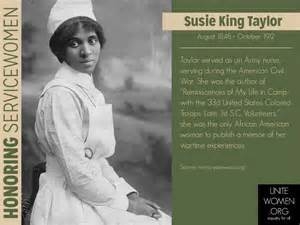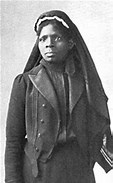- Community
-
Programs
- Schools
-
Careers
- RN Specialties
- Best RN Jobs and Salaries
- Aesthetic Nurse
- Nursing Informatics
- Nurse Case Manager
- NICU Nurse
- Forensic Nurse
- Labor and Delivery Nurse
- Psychiatric Nurse
- Pediatric Nurse
- Travel Nurse
- Telemetry Nurse
- Dermatology Nurse
- Nurse Practitioner
- Best NP Jobs and Salaries
- Family NP (FNP)
- Pediatric NP
- Neonatal NP
- Oncology NP
- Acute Care NP
- Aesthetic NP
- Women's Health NP
- Adult-Gerontology NP
- Orthopedic NP
- Emergency NP
- Psychiatric-Mental Health NP (PMHNP)
- APRN
- Nurse Educator
- Nurse Administrator
- Certified Nurse Midwife (CNM)
- Clinical Nurse Specialist (CNS)
- Certified Registered Nurse Anesthetist (CRNA)
- Resources
- Education



Most people in the nursing community are at least somewhat knowledgeable about the stories behind the more popular historical figures of the profession. After all, instant name recognition occurs in the vast majority of nurses when the names Florence Nightingale, Dorothea Dix, Mary Eliza Mahoney, Linda Richards, Clara Barton, and Margaret Sanger are mentioned. We have all learned about these remarkable individuals and their achievements during the course of our nursing educations. These aforementioned women are arguably the pioneers of the nursing profession because, without their contributions, nursing might not have ever evolved into a profession in its own right.
Nonetheless, many other wondrous nurses from yesteryear have faded into languid obscurity along with their stories and accomplishments. Susie King Taylor, the first African-American army nurse, is one notable historical figure whose story is rarely brought to light by modern day nursing textbooks. In the spirit of Black History Month, her story will be revived and she will be remembered for all the feats that she accomplished during her 64 years on earth.
Susie King Taylor was born Susan Baker on August 6, 1848. She had been born into slavery in Liberty County, Georgia to parents Hagar and Raymond Baker, and was the oldest of nine children. In an era where formally educating slaves was vehemently against the law, her personal road to informal educational attainment began at age seven. It was during this time period that she started learning to read and write by way of attending a 'secret school' that was operated by a freed African-American female named Mrs. Woodhouse and her daughter, Mary Jane. She also received secret informal reading lessons from a white playmate named Katie O'Connor.
At the age of 14, Baker and a number of other African-American people obtained their freedom by escaping to St. Simons Island, one of the Georgia Sea Islands. The year was 1862 and the U.S. was in the midst of the full-blown Civil War conflict. At that time, St. Simons Island was occupied by Union Army forces, and her advanced literacy skills had attracted the attention of several officers. After all, it was exceedingly uncommon for former slaves to be educated or even know how to read and write at a marginal level, but Baker was a resounding exception.
She agreed to organize a rudimentary school upon the request of Commodore Louis M. Goldsborough, and thus, became the first African-American teacher at a freedmen's school in the state of Georgia. Baker taught basic literacy skills to 40 freed children and a handful of free adults. She taught at the school for approximately six months until the end of 1862, the time when St. Simons Island was evacuated. During her six months at the freedmen's school, she met and married Sgt. Edward King, a non-commissioned officer in the Port Royal encampment of the 1st South Carolina volunteers, which later changed its name to the 33rd U.S. Colored Troops subdivision.
She followed her husband's regiment for three years, providing an assortment of services along the way. She taught Union soldiers how to read and write during their off-hours. She also served as a nurse, rendering care to wounded and dying soldiers and attending to injuries alongside camp doctors. Susie King made frequent visits to the first regimental hospital for black soldiers, located in Beaumont, South Carolina. It was at this hospital that she became acquainted with and worked alongside Clara Barton, the renowned founder of the Red Cross. King served as an army nurse until the Civil War ended in 1865.
Her husband, Edward, died in 1866. After teaching freedmen in Georgia for several more years, she relocated to Boston with her two young children and eventually got remarried. She married a man named Russell L. Taylor in 1879 and, from this point forward, became known as Susie King Taylor. She spent her later years working as a domestic worker for a white Bostonian family before dying in relative obscurity in 1912.
Susie King Taylor is one of the few African-American figures from the Civil War who captured her recollections in the written word. Her memoir, Reminiscences of My Life in Camp with the 33rd United States Colored Troops Late 1st S.C. Volunteers, tells the story of what is known about her life and experiences during wartime. Taylor's compassion for the sick, injured and wounded shine through her words. She writes, "It seems strange how our aversion to seeing suffering is overcome in war, --how we are able to see the most sickening sights, such as men with their limbs blown off and mangled by the deadly shells, without a shudder, and instead of turning away, how we hurry to assist in alleviating their pain . . . with feelings only of sympathy and pity" (Taylor, 1902).
Taylor's accomplishments deserve to be highlighted since she lived a full life that involved unselfish service to others in the form of teaching and nursing. Allnurses.com Inc. wishes to keep the spirit and memory of Susie King Taylor alive.
References
Butchart, R.E. (2013). Susie King Taylor (1848-1912). New Georgia Encyclopedia. Retrieved from Susie King Taylor (1848-1912) | New Georgia Encyclopedia
Malburne, M. (2004). Summary of Reminiscences of My Life in Camp with the 33rd United States Colored troops Late S.C. Volunteers. Retrieved from Summary of Reminiscences of My Life in Camp with the 33d United States Colored Troops Late 1st S. C. Volunteers
Taylor, S.K. (1902). Reminiscences of My Life in Camp with the 33rd United States Colored troops Late S.C. Volunteers. Boston, MA: Susie King Taylor.
About TheCommuter, BSN, RN
TheCommuter, BSN, RN, CRRN is a longtime physical rehabilitation nurse who has varied experiences upon which to draw for her articles. She was an LPN/LVN for more than four years prior to becoming a Registered Nurse.
Share this post
Share on other sites